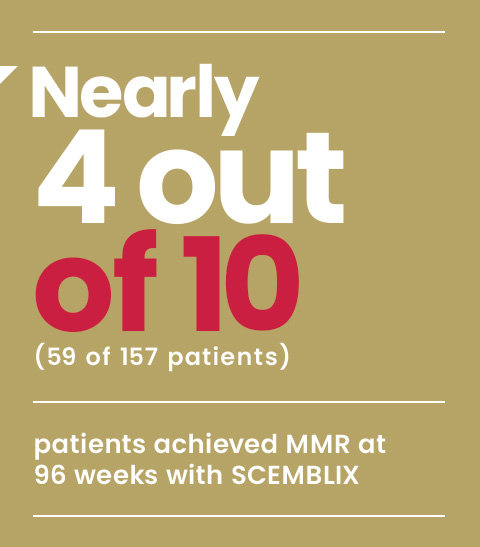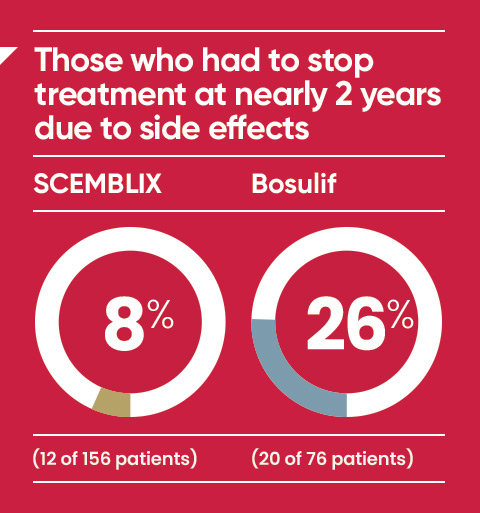
Some patients with Ph+ CML in chronic phase experience twists and turns along the way
Has your doctor had to switch you from one tyrosine kinase inhibitor (TKI) for Ph+ CML in chronic phase to another? And another? And perhaps yet another still?
Your doctor may have made the switch because you did not respond to treatment. Or side effects became unmanageable. If this sounds all-too familiar, it may be time to ask your doctor about SCEMBLIX.
Who is SCEMBLIX for?
SCEMBLIX is a prescription medicine used to treat adults with:
It is not known if SCEMBLIX is safe and effective in children. |
Some patients struggle with drug resistance or unmanageable side effects
For some people, the journey with Ph+ CML in chronic phase can have its ups and downs. That can be for a number of reasons:
Your body does not respond to a medication, which is known as primary drug resistance
Your body stops responding to a medication, referred to as secondary drug resistance
Side effects become unmanageable, which can make it difficult to stay on track with your treatment
Don’t keep concerns about your current medication to yourself
If you’re not seeing the results you had expected from your current treatment for Ph+ CML in chronic phase, or side effects are becoming more bothersome, it’s important to speak up. Tell your doctor about any concerns you may have.
You may want to talk with your doctor to see if SCEMBLIX may be right for you. A good way to get the conversation started is by using this Doctor Discussion Guide.
How SCEMBLIX works
SCEMBLIX is the first and only TKI that is thought to bind to a different site within the abnormal protein that causes Ph+ CML in chronic phase. Your doctor may refer to this as the myristoyl pocket. |
More patients achieved MMR with SCEMBLIX than with Bosulif
SCEMBLIX is the first treatment for Ph+ CML in chronic phase to show superior efficacy, such as response rates, vs Bosulif® (bosutinib)* in a clinical trial.
In a clinical study among those who did not respond to or did not tolerate 2 or more prior TKIs for Ph+ CML in chronic phase:
Nearly twice as many patients achieved a major molecular response (MMR) with SCEMBLIX at 24 weeks than with Bosulif. The results were 25% for SCEMBLIX (40 of 157 patients) vs 13% for Bosulif (10 of 76 patients)

Nearly 40% of patients achieved MMR at 96 weeks
In the same clinical study among patients with Ph+ CML in chronic phase who were previously treated with 2 or more TKIs:
More than twice as many patients achieved MMR with SCEMBLIX at nearly 2 years (96 weeks) than with Bosulif. The results were 38% for SCEMBLIX (59 of 157 patients) vs 16% for Bosulif (12 of 76 patients)
In this clinical trial, the most common side effects reported (≥20%) with SCEMBLIX were nose/throat infections; pain in the muscles, bones, or joints; headache; and tiredness.
*Bosulif is a registered trademark of Pfizer Inc.

Three times fewer SCEMBLIX patients stopped treatment due to side effects
More patients taking SCEMBLIX were able to continue their treatment than those taking Bosulif. After nearly 2 years (96 weeks), 26% of patients taking Bosulif (20 of 76 patients) had to stop taking their medication due to side effects compared to 8% of those taking SCEMBLIX (12 of 156 patients).

Talk with your doctor about SCEMBLIX
When you have Ph+ CML in chronic phase, it’s important to be your own advocate. To help you have a productive conversation, download the Doctor Discussion Guide.
Download Doctor Discussion Guide
Common side effects of SCEMBLIX
The most common side effects of SCEMBLIX include:
nose, throat, or sinus (upper respiratory tract) infections
muscle, bone, or joint pain
headache
tiredness
nausea
rash
diarrhea
decreased blood platelet counts, white blood cell counts, and red blood cell counts
increased blood fat (triglycerides) levels
increased blood creatine kinase levels
increased blood liver enzyme levels
increased blood pancreas enzyme (amylase and lipase) levels
increased blood uric acid levels
Your doctor may change your dose, temporarily stop, or permanently stop treatment with SCEMBLIX if you have certain side effects.
SCEMBLIX may cause fertility problems in females. This may affect your ability to have a child. Talk to your doctor if this is a concern for you.
Be sure to review information about the serious and most common side effects of SCEMBLIX. Learn more
How to take SCEMBLIX
If your doctor prescribes SCEMBLIX after you have been treated with 2 prior TKIs, be sure to take the medication exactly as instructed.
Do not eat for at least 2 hours before taking SCEMBLIX and 1 hour after your dose. Learn more about taking SCEMBLIX.
How many TKIs have you taken?
If you’ve taken 2, 3, 4 or more medications for Ph+ CML in chronic phase and are experiencing drug resistance or unmanageable side effects, it may be time to ask your doctor about SCEMBLIX. The medication is thought to work by binding to a different site on the abnormal protein than other medications that treat Ph+ CML in chronic phase. If your treatment journey has been anything but a straight line, use the Doctor Discussion Guide to let your doctor know your concerns.
|



